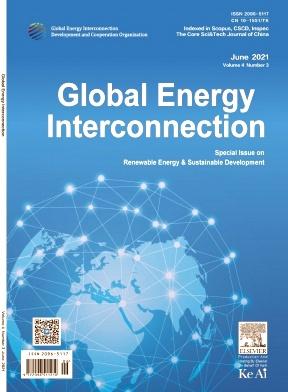Adaptive linear active disturbance-rejection control strategy reduces the impulse current of compressed air energy storage connected to the grid
IF 1.9
Q4 ENERGY & FUELS
引用次数: 0
Abstract
The merits of compressed air energy storage (CAES) include large power generation capacity, long service life, and environmental safety. When a CAES plant is switched to the grid-connected mode and participates in grid regulation, using the traditional control mode with low accuracy can result in excess grid-connected impulse current and junction voltage. This occurs because the CAES output voltage does not match the frequency, amplitude, and phase of the power grid voltage. Therefore, an adaptive linear active disturbance-rejection control (A-LADRC) strategy was proposed. Based on the LADRC strategy, which is more accurate than the traditional proportional integral controller, the proposed controller is enhanced to allow adaptive adjustment of bandwidth parameters, resulting in improved accuracy and response speed. The problem of large impulse current when CAES is switched to the grid-connected mode is addressed, and the frequency fluctuation is reduced. Finally, the effectiveness of the proposed strategy in reducing the impact of CAES on the grid connection was verified using a hardware-in-the-loop simulation platform. The influence of the k value in the adaptive- adjustment formula on the A-LADRC was analyzed through simulation. The anti-interference performance of the control was verified by increasing and decreasing the load during the presynchronization process.
自适应线性有源干扰抑制控制策略可降低并网压缩空气储能的脉冲电流
压缩空气储能(CAES)具有发电量大、使用寿命长、环保安全等优点。当 CAES 发电站切换到并网模式并参与电网调节时,使用精度较低的传统控制模式可能会导致并网脉冲电流和结点电压过高。出现这种情况的原因是 CAES 输出电压与电网电压的频率、幅值和相位不匹配。因此,有人提出了一种自适应线性有源干扰抑制控制(A-LADRC)策略。与传统的比例积分控制器相比,线性有源干扰抑制控制策略的精度更高,在此基础上,对控制器进行了改进,允许对带宽参数进行自适应调节,从而提高了精度和响应速度。解决了 CAES 切换到并网模式时的大脉冲电流问题,并降低了频率波动。最后,利用硬件在环仿真平台验证了所提策略在减少 CAES 对并网影响方面的有效性。通过仿真分析了自适应调整公式中 k 值对 A-LADRC 的影响。通过在预同步过程中增加和减少负载,验证了控制的抗干扰性能。
本文章由计算机程序翻译,如有差异,请以英文原文为准。
求助全文
约1分钟内获得全文
求助全文
来源期刊

Global Energy Interconnection
Engineering-Automotive Engineering
CiteScore
5.70
自引率
0.00%
发文量
985
审稿时长
15 weeks
 求助内容:
求助内容: 应助结果提醒方式:
应助结果提醒方式:


